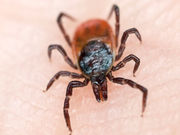Haemaphysalis longicornis salivary gland protein-specific IgE ID’d in sera of patients with meat allergy
MONDAY, Nov. 16, 2015 (HealthDay News) — Tick bites can induce immunoglobulin E (IgE) antibodies to galactose-α-1,3-galactose (α-Gal), a major IgE-binding epitope on red meat allergens, according to a study published online Nov. 9 in Allergy.
Yuko Chinuki, M.D., Ph.D., from Shimane University in Izumo, Japan, and colleagues speculated that tick bites may cause meat allergies, both of which have high incidence in the Shimane prefecture.
By immunoblotting using anti-α-Gal antibody, the researchers detected the carbohydrate α-Gal in the salivary gland protein of Haemaphysalis longicornis, the vector for Japanese spotted fever. In the sera of 24 of 30 patients with red meat allergies they detected H. longicornis salivary gland protein-specific IgE.
“Sensitization to tick salivary gland protein containing α-Gal is possibly a major etiology of red meat allergy; the carbohydrate plays a crucial role in its allergenicity,” the authors write. “These results further indicate that the α-Gal epitope is present not only in Amblyomma or Ixodes, but also in Haemaphysalis.”
Copyright © 2015 HealthDay. All rights reserved.








